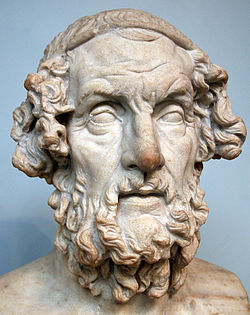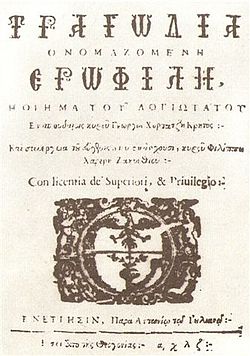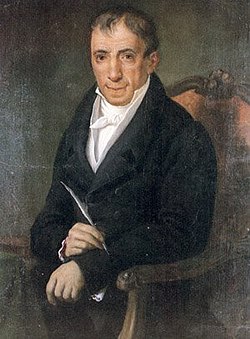Ancient Greek literature (c. 800 BC – c. 330 AD)
Ancient Greek literature refers to literature written in Ancient Greek dialects. These works range from the oldest surviving written works in the Greek language until works from the fifth century AD. The Greek language arose from the proto-Indo-European language; roughly two-thirds of its words can be derived from various reconstructions of the tongue. A number of alphabets and syllabaries had been used to render Greek, but surviving Greek literature was written in a Phoenician-derived alphabet that arose primarily in Greek Ionia and was fully adopted by Athens by the fifth century BC. [1]

Preclassical (c. 800 – c. 500 BC)
All ancient Greek literature was to some degree oral in nature, and the earliest literature was completely so. [2] The Greeks created poetry before making use of writing for literary purposes. Poems created in the Preclassical period were meant to be sung or recited (writing was little known before the 7th century BC). Most poems focused on myths, legends that were part folktale and part religion. Tragedies and comedies emerged around 600 BC. [3]
At the beginning of Greek literature stand the works of Homer; the Iliad and the Odyssey . Though dates of composition vary, these works were fixed around 800 BC or after. Another significant figure was the poet Hesiod. His two surviving works are Works and Days and Theogony .
Classical (c. 500 – 323 BC)
During the classical period, many of the genres of western literature became more prominent. Lyrical poetry, odes, pastorals, elegies, epigrams; dramatic presentations of comedy and tragedy; histories, rhetorical treatises, philosophical dialectics, and philosophical treatises all arose in this period. [4]
The two major lyrical poets were Sappho and Pindar. Of the hundreds of tragedies written and performed during this time period, only a limited number of plays survived. These plays are authored by Aeschylus, Sophocles, and Euripides. [5]
The comedy arose from a ritual in honor of Dionysus. These plays were full of obscenity, abuse, and insult. The surviving plays by Aristophanes are a treasure trove of comic presentation.
Two influential historians of this age are Herodotus and Thucydides. A third historian, Xenophon, wrote "Hellenica," which is considered an extension of Thucydides's work. [6]
The greatest prose achievement of the 4th century BC was in philosophy. Greek philosophy flourished during the classical period. Of the philosophers, Socrates, Plato, and Aristotle are the most famous.
Hellenistic (323–31 BC)
By 338 BC many of the key Greek cities had been conquered by Philip II of Macedon. Philip II's son Alexander extended his father's conquests greatly.
The Hellenistic age is defined as the time between the death of Alexander the Great and the rise of Roman domination. After the 3rd century BC, the Greek colony of Alexandria in northern Egypt became the center of Greek culture.
Greek poetry flourished with significant contributions from Theocritus, Callimachus, and Apollonius of Rhodes. Theocritus, who lived from about 310 to 250 BC, was the creator of pastoral poetry, a type that the Roman Virgil mastered in his Eclogues. [7]
Drama was represented by the New Comedy, of which Menander was the principal exponent.
One of the most valuable contributions of the Hellenistic period was the Septuagint translation of the Old Testament into Greek. This work was done at Alexandria and completed by the end of the 2nd century BC.

Roman Age (31 BC – 284 AD)
Literature in Greek in the Roman period contributed significant works to the subjects of poetry, comedy, history, and tragedy. A large proportion of literature from this time period were histories.
Significant historians of the period were Timaeus, Polybius, Diodorus Siculus, Dionysius of Halicarnassus, Appian of Alexandria, Arrian, and Plutarch. The period of time they cover extends from late in the 4th century BC to the 2nd century AD.
Eratosthenes of Alexandria wrote on astronomy and geography, but his work is known mainly from later summaries. The physician Galen pioneered developments in various scientific disciplines including anatomy, physiology, pathology, pharmacology, and neurology. This is also the period in which most of the Ancient Greek novels were written.
The New Testament, written by various authors in varying qualities of Koine Greek, hails from this period. The Gospels and the Epistles of Saint Paul were written in this time period as well. [8]







